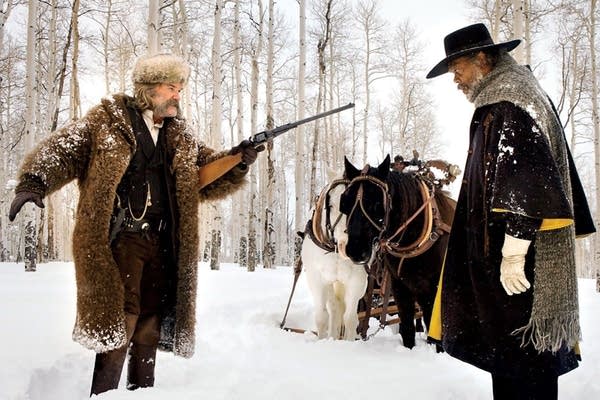As a filmmaker, if you want to signal your intention to enter the canon of movie Westerns, there's hardly a better way to do it than by enlisting Ennio Morricone to write your score. Quentin Tarantino sends a few more signals that The Hateful Eight is a Western with a capital W: the sweeping landscapes, the retro titles, the rampant bloodshed.
Tapping Morricone — composer of the scores for films like The Good, the Bad and the Ugly and Once Upon a Time in the West, returning to the genre for the first time in 40 years — was also a sign that Hateful Eight wasn't just going to be an ordinary action flick.
Morricone is associated with "Spaghetti Westerns," the body of work in the 1960s and '70s that saw Italian directors like Sergio Leone turn frontier dramas into vast epics exploring complex moral themes, shot with often breathtaking cinematography and accompanied by some of the greatest film scores of all time.
Spaghetti Westerns both burnished the mythology of America's westward expansion and examined it in a new light, with characters whose loyalties and pieties were challenged by the harsh, lawless realities of life on the frontier. Tarantino works a nifty new twist on the genre: with a vast wilderness surrounding them, his characters find themselves trapped in a one-room cabin.
Long stretches of entertaining chatter, punctuated by deadly violence, are Tarantino's stock in trade, and in The Hateful Eight — the most disciplined film he's ever made — he consistently plays to his strengths, with relatively few of the baroque stylistic flourishes that have sometimes tended to distract from the drama.
Set several years after the Civil War, The Hateful Eight deposits its eight eponymous characters into a Wyoming waystation where they need to wait out a multi-day blizzard. Among them are a pair of bounty hunters (Kurt Russell and Samuel L. Jackson); a wanted murderer (Jennifer Jason Leigh); the sheriff (Walton Goggins) and hangman (Tim Roth, whose character is confusingly not the one nicknamed "The Hangman") who expect to later dispatch the murderer; a Confederate general (Bruce Dern); a cowboy (Michael Madsen); and the cabin's caretaker (Demián Bichir).
Needless to say, not all of the characters are who they claim to be, and when guns (among a Clue game's worth of other deadly weapons) start to come out, the characters become increasingly desperate to know who can be trusted. In the meantime, they make coffee, play piano, and tell tall tales about their personal histories.
A lot of writers try to get comic relief from the quirks and petty annoyances of hardened criminals, but no one does it like Quentin "Royale with Cheese" Tarantino. Enlisting some of the most deliciously malevolent alumni from his preceding seven films, Tarantino fills this long film with over-the-top characterizations and fleet-footed dialogue. There are tense moments, but since by design we don't really care too much about any of these characters (see: the title), the film is mostly about the guilty pleasure of watching these baddies bump chests as they wait out the storm.
The fact that most of the action takes place in a small cabin doesn't diminish the film's visual beauty. Cinematographer Robert Richardson (one of only two living three-time winners of the Oscar for Best Cinematography) bathes the cabin in a subtly surreal glow — the light from a lantern becomes a heavenly halo, a roaring fire beams its orange glow across half the set, and light sneaks in from a vast array of cracks and crevices.
True fans and movie geeks will want to see the film on 70mm film — it's the first Ultra Panavision 70 feature film release in half a century. I saw it on digital projection, though, and it still looked pretty great. Though Morricone's soaring score, with his distinctive modern-romantic vocabulary (partially recycled from a 1982 project where much of the music he wrote wasn't used), is used more sparingly than film-music buffs might have hoped, it's an essential part of this wickedly satisfying Western.
Love the music?
Show your support by making a gift to YourClassical.
Each day, we’re here for you with thoughtful streams that set the tone for your day – not to mention the stories and programs that inspire you to new discovery and help you explore the music you love.
YourClassical is available for free, because we are listener-supported public media. Take a moment to make your gift today.

